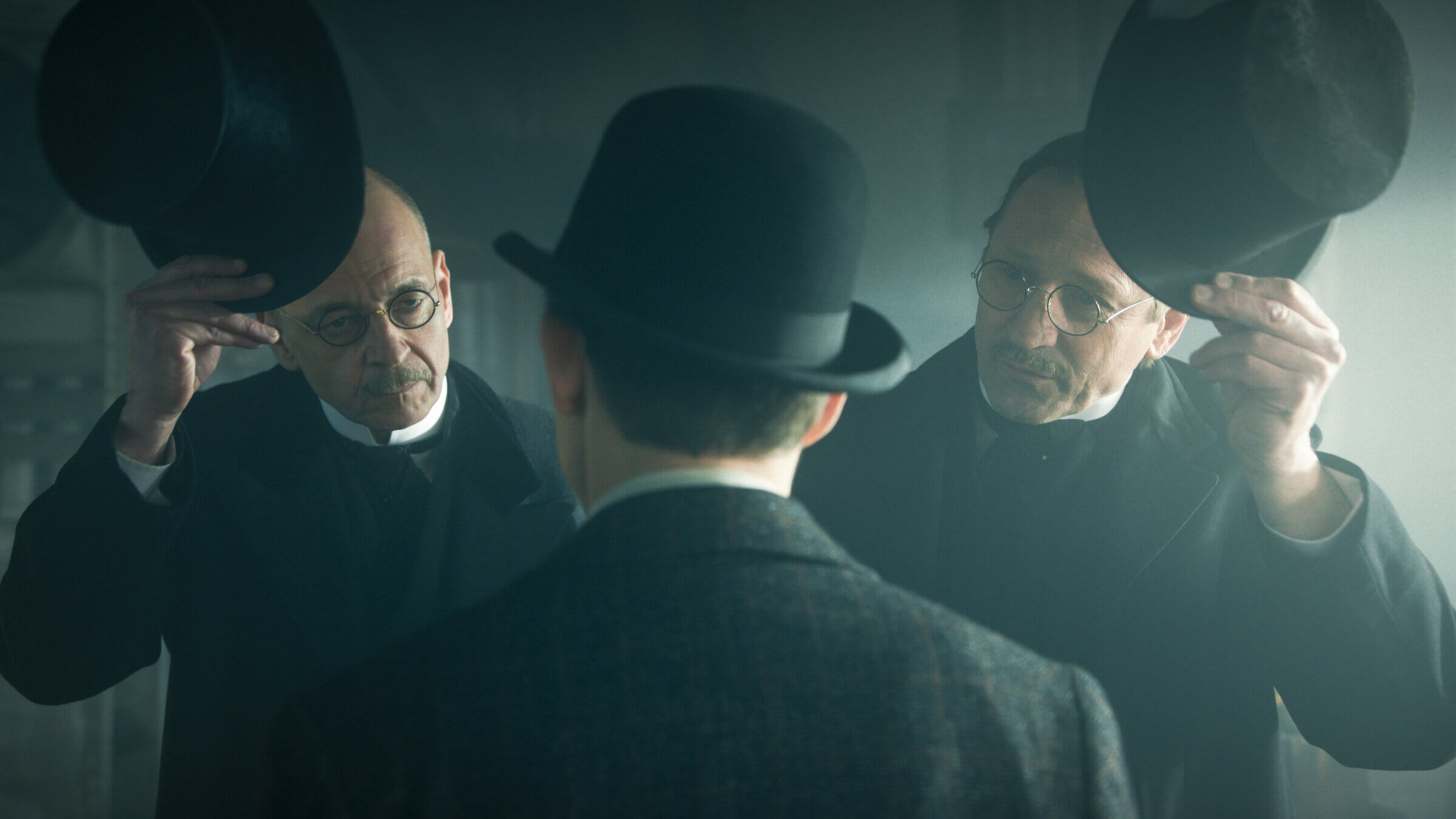Wes Anderson meets Franz Kafka in a new streaming series
‘Kafka’ tells the story of the author’s life, death and conflicted Jewish identity

Kafka and two men with suspicious intentions. Photo by ORF/Superfilm/Nicole Albiez
It is perhaps best, in the case of Franz Kafka, history’s most famous insurance clerk, to review his brief existence as if it were a life insurance claim.
The handsomely-mounted German-Austrian miniseries Kafka, arriving on ChaiFlicks in time for the centennial of the author’s death this June, begins by laying out the facts. Kafka, a Jewish Bohemian author lived 40 years and 11 months and died of laryngeal tuberculous in a sanatorium near Vienna.
This inventory is given to us through clinical narration, accompanied by slides of postcards and photographs. Then, in a Wes Andersonian sequence, out pop his bequests: books representing Kafka’s 350 pages of completed texts and countless more unpublished works, all of which the deceased ordered destroyed.
It is through the data of his limited travels, his relationships and his involvement with an asbestos company, with which the show, arranged by themes of family, women and work, hopes to solve the enduring mystery of Kafka’s literary inspiration and his desire to consign his work to the ash heap.
Swiss actor Joel Basman plays Kafka, a slight man committed to routine, who chews each bit of food 40 times on the faddish advice of a quack named Horace Fletcher. He laughs at inappropriate times, is intensely sensitive but unable to spare others’ feelings. He lives by a train schedule. To contemporary eyes he may read as autistic, and the series makes clear that he was also a man whose circumstances perfectly primed him to launch an overused adjective for anything byzantine, bureaucratic, arbitrary or casually cruel.
Kafka is tasked with compensating, and approving employment for, men maimed in the First World War. He takes ill toward the war’s end and, when he wakes up, discovers he’s a citizen of a different country with a new boss who speaks another language.
The series argues that perhaps most central to Kafka’s bemused alienation — under which Josef K, Gregor Samsa and the poor victim of In the Penal Colony — is Kafka’s Jewishness, which, like so much else, was a source of agonizing ambivalence.
Zionism, the ideology of his fiancee, Felice Bauer, draws out both Kafka’s disgust and admiration. In the third episode, which follows Kafka’s friendship with Yiddish theater actor Jizchak Löwy, Kafka’s father, Hermann (Nicholas Ofczarek), is aghast at a Yiddish speaker at their Germanophone, assimilated, middle-class table.
In a quote ripped from Kafka’s diaries, Hermann thunders, “Lie down with dogs, you wake up with fleas” and calls their guest “vermin;” Löwy fires back that the Kafkas are fake Jews who probably don’t even know what the afikomen is.
This incident transitions into Kafka’s vision of Gregor Samsa awakening as a giant stinkbug, neglected by his family, played by the same actors who portray the Kafka clan, until he dies and the maid breaks up the carcass with a broom. The episode ends with a coda noting how the Nazis, holding Jews to be subhuman, murdered Löwy and all of Kafka’s sisters in the Holocaust. Despite their varying levels of observance, they were all vermin enough for the Nazis. We see World War II, briefly, as Max Brod (David Kross) flees the country with Kafka’s papers.
In between the bouts of magical realism, production designed like most everything with a prim geometric — and yes Kafkaesque — flourish, are scenes that linger on Kafka’s romances, notably his affair with his translator Milena Jesenská, played by Babylon Berlin’s Liv Lisa Fries. This episode foreshadows the darkness Kafka won’t live to see, when a loudmouthed Austrian nationalist rails against Jews as the couple sit for a meal. What goes unsaid is that Jesenská, who tells the man off, would, after Kafka’s death, join the resistance, die at Ravensbruck and be counted in Yad Vashem’s Righteous Among Nations.
The inquiry into Kafka, what made him tick, how he reshaped the canon against his own wishes, is not so simply resolved.
As his death and the series end draws near, we find him with his last partner, Dora Diamant (Tamara Romera Ginés), speaking to her in Hebrew about his desire to move to Palestine and saying the prayer over the Shabbat candles. Kafka did learn Hebrew from Diamant, and his works did, after a Kafkaesque ordeal, reach the National Library of Israel, but the moment doesn’t ring true as a source of ultimate comfort as he faded away.
As much as it fascinated him, the dream of Jewish statehood, built on a premise of shared identity, would have likely been yet another nightmare for Kafka. We can turn to the text for this one.
As he memorably wrote, and says in the series: “What do I have in common with Jews? I hardly even have anything in common with myself.”
Wherever Kafka went, there he was. And he often felt like he was being followed.
The series Kafka arrives on ChaiFlicks June 6.

















